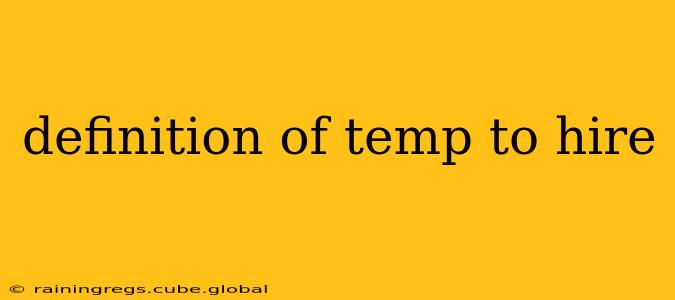Temp-to-hire, also known as temporary-to-permanent employment, is a hiring process where a company initially employs a worker on a temporary or contract basis. The intention is to evaluate the employee's skills, performance, and cultural fit within the organization before offering them a permanent, full-time position. This arrangement benefits both the employer and the employee, providing a risk-mitigation strategy for the company and a valuable opportunity for the worker to prove their capabilities.
This arrangement differs significantly from traditional direct hiring, where a candidate is offered a permanent role immediately after the interview process. The temporary phase allows for a thorough assessment of the employee's suitability for the long-term, reducing the chances of a costly and time-consuming mismatch.
What are the stages involved in a temp-to-hire process?
The temp-to-hire process typically involves several distinct stages:
-
Application and Screening: The process begins like any other job application, with candidates submitting their resumes and cover letters. Recruiters or hiring managers will then screen applicants to identify those who meet the minimum requirements.
-
Temporary Assignment: Selected candidates are hired on a temporary basis, often through a staffing agency or directly by the company. This temporary period usually lasts for a predetermined length, ranging from a few weeks to several months. During this time, the employee works alongside the permanent team, performing the same job duties as a full-time employee would.
-
Performance Evaluation: Throughout the temporary assignment, the employee's performance is closely monitored. Regular check-ins, performance reviews, and feedback sessions are crucial during this stage. This helps assess not only technical skills but also aspects like teamwork, communication, problem-solving, and overall fit within the company culture.
-
Conversion to Permanent Role: If the employer is satisfied with the temporary employee's performance and contributions, they'll typically extend a full-time offer. This offer may include a salary increase, benefits package, and other perks associated with permanent employment.
-
Onboarding (if applicable): Once the offer is accepted, the employee will transition into a full-time role. This may involve additional onboarding processes, depending on the company's policies.
What are the advantages of temp-to-hire for employers?
- Reduced Hiring Risk: Temp-to-hire significantly reduces the risk of hiring a poor fit. Employers can assess the candidate's skills and work ethic before making a long-term commitment.
- Cost Savings: The initial temporary period can be less expensive than directly hiring a full-time employee, as it often involves lower salary and benefits costs.
- Increased Flexibility: This arrangement provides flexibility to adjust staffing levels based on business needs. If the temporary employee doesn't work out, the company can easily end the contract without significant repercussions.
- Access to a Wider Talent Pool: Temp agencies often have access to a larger pool of candidates than a company might be able to reach independently.
What are the advantages of temp-to-hire for employees?
- Gaining Experience: Temporary positions provide valuable work experience and the chance to showcase skills to a potential employer.
- Opportunity for Full-Time Employment: Temp-to-hire offers a pathway to a permanent position within a company.
- Improved Job Security: While the initial employment is temporary, the potential for conversion to a permanent role offers increased job security.
- Networking Opportunities: This arrangement provides a great opportunity to build professional relationships and expand your network within the company.
How long is a typical temp-to-hire assignment?
The length of a temp-to-hire assignment varies depending on the position, company, and individual circumstances. It can range from a few weeks to several months. The duration is often determined based on the time required to adequately assess the employee's skills and fit within the company.
What are the differences between temp, contract, and temp-to-hire?
While the terms are often used interchangeably, there are key differences:
- Temporary (Temp): Short-term employment with a clearly defined end date. There's usually no expectation of a permanent position.
- Contract: Longer-term employment with a specific project or task. The contract outlines the scope of work, duration, and payment terms. Like temporary positions, conversion to permanent employment is not guaranteed.
- Temp-to-Hire: A temporary assignment with the explicit intention of evaluating the employee for a permanent role.
Is temp-to-hire right for me?
Whether temp-to-hire is the right approach for you depends on your individual career goals and circumstances. It's an excellent option if you're seeking valuable experience, a potential pathway to permanent employment, and the opportunity to prove your abilities within a company. However, if you're seeking immediate long-term employment, this path might not be the best fit.
This comprehensive overview should provide a clear understanding of temp-to-hire employment. Remember to always thoroughly research the specific terms and conditions of any employment offer.
